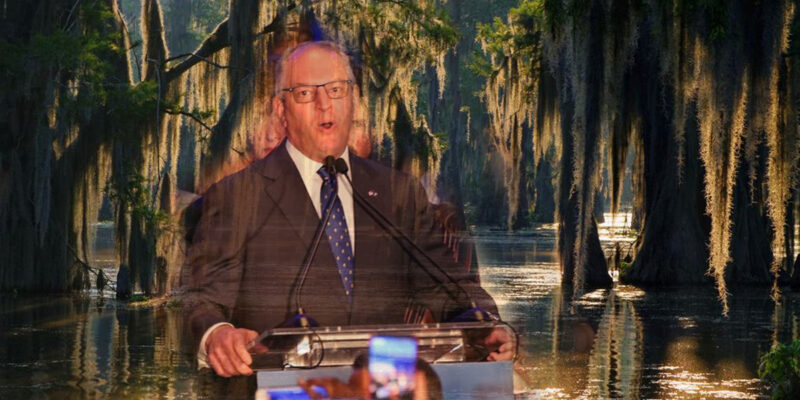Democrat Gov. John Bel Edwards’ influence in Louisiana government is fading quickly, with the chances of anybody in power emulating his policies in the future evaporating even more rapidly.
With fewer than six months remaining in his terms. Edwards got a taste of how ephemeral his reach has become when Louisiana’s Board of Pardons and Committee on Parole rebuffed over 50 applicants – essentially the entirety of death row – for clemency this reduction of sentence to life earlier than usual. Normally, the Board requires a time-consuming review of cases but can waive that, which in this instance would have expedited case consideration for resolution prior to year’s end.
This avalanche of requests Edwards triggered when, after dodging the question for his whole political career because of the electoral blowback his answer would invite, earlier this year he proclaimed opposition to capital punishment, noting its finality and calling it contrary to his religious faith (while he professes a belief in Roman Catholicism, at the same time he selectively ignores others of its imperatives, such opposition to abortion for any reason). In turn, this begat an effort by legal services supporting appeals to capital cases to organize inmates under capital sentences to make clemency requests to Edwards, in the hopes of having him grant clemency in mass before leaving office early next year.
However, the Constitution requires all such requests first must gain assent from the Board of Pardons, a five-member body comprised of gubernatorial appointees serving concurrently with a governor’s term. Statistically, this represents a commutation reducing sentence, and in 2022 the Board passed along 105 commutations and pardon requests, of which the governor approved 95, so his appointees and he typically are in sync.
Yet the Board – with all five Edwards appointees – in this instance refused to rush to process, saying that only following the regular procedure would allow for the appropriate level of scrutiny. Thus, the attempt to negate capital punishment in Louisiana through administrative fiat failed because his own people wouldn’t go along with it.
This demonstration of his diminishing power came as Board members took seriously their duty, perhaps with an eye towards reappointment by the next governor who will value members that don’t bend to the whim of political fashion. That Edwards successor appears less and less likely to be his endorsed candidate, Democrat former Department of Transportation and Development Sec. Shawn Wilson.
In a recent poll, Wilson corralled 28 percent of the vote. Problem is, that only put him in second place to GOP Atty. Gen. Jeff Landry at 30 percent with the rest of the field, all Republicans save a no party candidate, all in single digits lapping up the remaining 22 percent that made a choice.
Advertisement
For Wilson, these are discouraging numbers, to say the least. Given that 29 percent of the 20 percent undecided portion are black like Wilson and he can be expected to capture roughly 90 percent of that if they vote, and assuming among white and other voters he captures among the undecided the same proportions as now, his ceiling for the general election is about 37 percent. He would need to go over 40 even to be competitive with Landry, who the poll puts far ahead of his Republican rivals, in a runoff.
Wilson would have to pull off some considerable vote intent conversion for that to happen, and it won’t if news events continue to work against him, the latest being the announcement that a new Interstate 10 bridge in Lake Charles will have tolling. Wilson’s record at DOTD is uninspiring, to say the least, with a demonstrated inability to get projects moving along; this one has dragged on for many years.
The I-10 bridge over the Calcasieu River has been Wilson’s baby for his nearly eight years at the helm of DOTD, and residents and officials already have expressed their unhappiness that they will have to fork over more than two bucks every trip over it. That’s not exactly going to endear them to him and voters statewide also will notice that this was the best Wilson could do, which isn’t much.
Additionally, that the same survey showed the majority of Louisianans saw the state headed in the wrong direction and fewer than a quarter thought the opposite, which voters will blame on Edwards and anybody attached to him. Given that Edwards has shown close to zero electoral coattails – in his two elections the GOP has tacked on three senators and ten representatives to achieve supermajorities in both legislative chambers – expect that his backwards-looking, revanchist era of liberal populism likely will end up as the last in Louisiana for a very long time.
Advertisement
Advertisement

